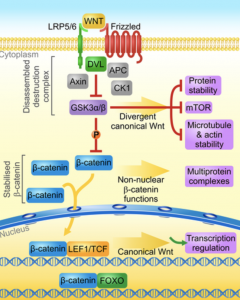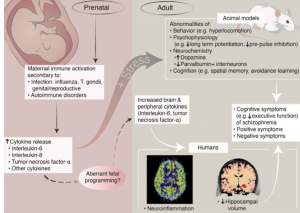Neurological diseases and disorders are health deficits that many people fear at some point in their lives. Some neurological diseases and disorders do not begin to suppress the brain and nervous system until later in life, but others can come as a result of molecular interactions that occurred before birth. One of these disorders that can be caused before birth includes Schizophrenia.
What goes wrong in the brain?
Schizophrenia is a neurological disorder that negatively affects a person’ ability to think clearly, behave normally, feel normally, and perceive reality normally. A common molecular pathway that has  been shown to be involved with schizophrenia is the Wnt signaling pathway. When the Wnt pathway is activated it induces a cascade of events that can effect nervous system functions including neural circuit formation and synaptic plasticity. This pathway can become disrupted in a multitude of ways, but those involved with schizophrenia include disruptions of the destruction complex. Disruption of this complex can cause increased activation of the protein complex GSK3beta. GSK3beta inhibits beta-catenin which is a necessary molecule for gene transcription. If beta-catenin is not able to attach to transcription factors, then nervous system functionality could be rendered.
been shown to be involved with schizophrenia is the Wnt signaling pathway. When the Wnt pathway is activated it induces a cascade of events that can effect nervous system functions including neural circuit formation and synaptic plasticity. This pathway can become disrupted in a multitude of ways, but those involved with schizophrenia include disruptions of the destruction complex. Disruption of this complex can cause increased activation of the protein complex GSK3beta. GSK3beta inhibits beta-catenin which is a necessary molecule for gene transcription. If beta-catenin is not able to attach to transcription factors, then nervous system functionality could be rendered.
In utero infections correlating to schizophrenia
As stated previously, the molecular abnormalities that are thought to be involved with schizophrenia can begin before one is even born. These in utero abnormalities can be caused by infection during pregnancy. Infections causing risk include influenza, viral infections, toxoplasmosis, rubella, and genital-reproduction infections (STDs). When a pregnant person becomes infected, their immune system becomes activated which can cause inflammation. When inflammation occurs, the  body can recruit inflammation-induced cytokines. There has been research that shows mothers who have birthed children who later are diagnosed with schizophrenia have been noted to have an elevation by nearly twofold of cytokine family molecules. Specifically, the most common cytokine family molecules that have been studied are interleukin-8 (IL8), interleukin-6 (IL6), tumor necrosis factor alpha (TNFalpha), as well as others. These molecules are soluble peptides that can cause decrease brain development and behavior abnormalities, and they have been correlated to decrease cerebral cortical neuron survival especially during brain development.
body can recruit inflammation-induced cytokines. There has been research that shows mothers who have birthed children who later are diagnosed with schizophrenia have been noted to have an elevation by nearly twofold of cytokine family molecules. Specifically, the most common cytokine family molecules that have been studied are interleukin-8 (IL8), interleukin-6 (IL6), tumor necrosis factor alpha (TNFalpha), as well as others. These molecules are soluble peptides that can cause decrease brain development and behavior abnormalities, and they have been correlated to decrease cerebral cortical neuron survival especially during brain development.
Preventative actions
The good news to this information is that infections can be treated as well as prevented. It is extremely important to decrease the amount of time the infection is present and the immune system is activated. Luckily, many bacterial infections can be treated with antibiotics. Antibiotics that are considered safe to take during pregnancy include penicillins (amoxicillin or ampicillin), cephalosporins, erythromycin, and  clindamycin. These antibiotics can treat genital reproductive infections which have been noted to increase a baby’s risk of schizophrenia. Infections of this realm such as STDs can also be prevented by using barrier contraceptives. As for influenza, it is possible to prevent infection by receiving the influenza vaccine. Although, it is not recommended to receive the vaccine during pregnancy since it can put the fetus at risk for cytokine response exposure. Toxoplasmosis can be prevented through altered hygienic approaches. These approaches including limiting exposure to cat litter and gardening, as well as when cooking with meats, poultry, and fish to be sure to cook thoroughly to ensure that if there is any T. gondii oocytes, they are killed and will not entire the mothers body through ingestion. Taking all of the precautions and treatments stated above are extremely important during pregnancy and even before pregnancy.
clindamycin. These antibiotics can treat genital reproductive infections which have been noted to increase a baby’s risk of schizophrenia. Infections of this realm such as STDs can also be prevented by using barrier contraceptives. As for influenza, it is possible to prevent infection by receiving the influenza vaccine. Although, it is not recommended to receive the vaccine during pregnancy since it can put the fetus at risk for cytokine response exposure. Toxoplasmosis can be prevented through altered hygienic approaches. These approaches including limiting exposure to cat litter and gardening, as well as when cooking with meats, poultry, and fish to be sure to cook thoroughly to ensure that if there is any T. gondii oocytes, they are killed and will not entire the mothers body through ingestion. Taking all of the precautions and treatments stated above are extremely important during pregnancy and even before pregnancy.
Since there are many variables that can attribute to diseases and disorders of a child, it becomes extremely difficult to avoid all of them during pregnancy. But, the more science tells us, the more we can do to prevent exposure to environmental and molecular risk factors.
